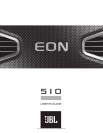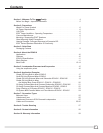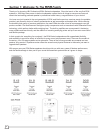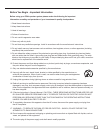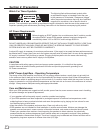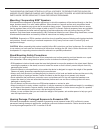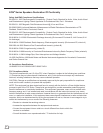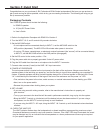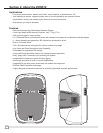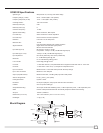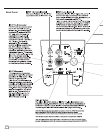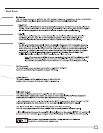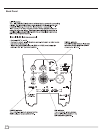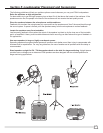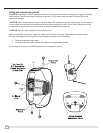
9
Section 3: Quick Start
Congratulations on your purchase of JBL Professional EON
®
Series loudspeakers! We know you are anxious to
get up and running as fast as possible, which is why you are reading this section. The following will help you get
set up as soon as possible.
Packaging Contents
Your EON510 system should include the following:
1 x EON510 speaker
1 x 10’(3m) IEC Power Cable
1 x User’s Guide
1. Refer to the Application Examples with EON510 in Section 6.
2. Turn the INPUT 1 & 2, and 3 controls fully counter-clockwise.
3. Set the MIC/LINE switch:
• If a microphone will be connected directly to INPUT 3, set the MIC/LINE switch to the
MIC position (depressed). The MIC LED will illuminate when power is turned on.
• If a mixer, CD player, cassette tape, or electronic musical instrument (the “source”) will be connected directly
to INPUT 3, set the MIC/LINE switch to the LINE position (disengaged).
4. Set the EQ control to the center position – Flat.
5. Plug the power cable into a properly grounded 3-wire AC power outlet.
6. Plug the XLR cable from the mixer or microphone into the INPUT 3 connector.
7. Connect other sources (if used) to the LINE 1 & 2 input connector.
8. POWER UP PROCEDURE
The main power switch is located on the input panel on the back of the enclosure. Always ensure that the
speaker system is the last thing you power up, and the rst thing to turn off when operating your complete PA
system. If speaker systems are daisy chained together always turn off the last system in the chain rst. Power
“on” is indicated by the illumination of the logo on the front of the enclosure and the power “on” LED.
• First, switch on the power to the mixer, audio sources, or musical instruments that are feeding your EON.
• Next, turn on the power switch.
• Reverse this process when shutting down your system.
9. SET VOLUME
• If you are using an audio mixing console, refer to the manufacturer’s instructions to properly set
gain structure.
• Turn up your sources to the level that will be used in performance and talk, sing or play into the system.
• Bring the INPUT 3 control up (clockwise) until the desired volume has been reached. If you are using a
microphone, turn the INPUT 3 control up slowly to avoid feedback.
• If you are using the INPUT 1 & 2 input, bring the INPUT 1 & 2 control up until the desired volume has been
reached.
10. CHECK THE LIMIT LED
The LIMIT indicator ashes when the loudspeaker’s on-board ampliers are approaching maximum output.
Occasional ashes are normal for very loud operation. However, if the LIMIT LED stays illuminated, the sound
may be distorted and it is an indication that more speakers or a lower performance volume may be required
for your specic application.



